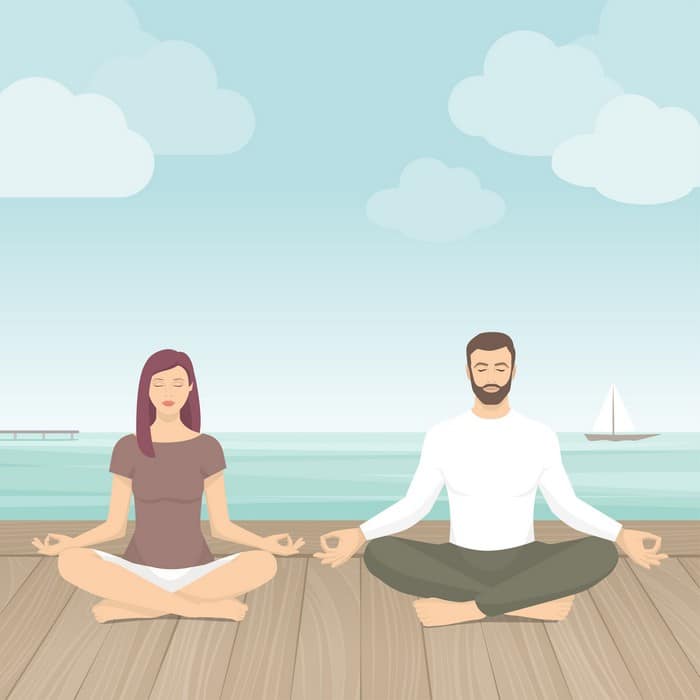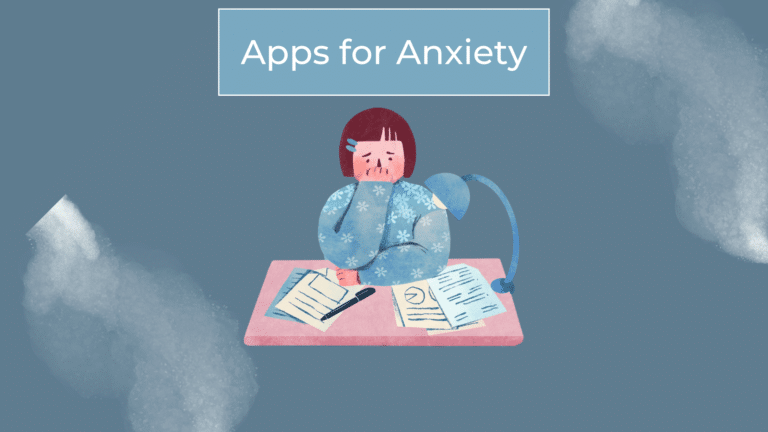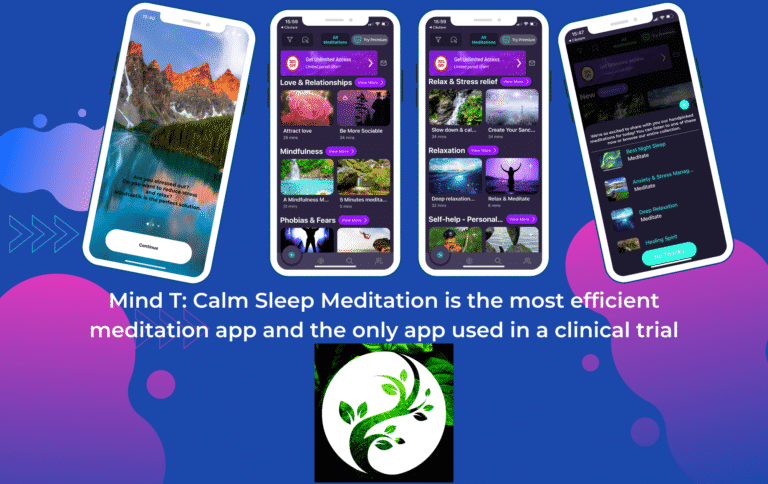Beginners Meditation Guide to Practice
Published on March 5, 2020 – Last Updated on May 11, 2022
If you are starting with meditation or wondering what it’s all about, Stick around. First, we’re going to talk about meditation for beginners. Then, you will learn the essential tips & tricks on how to start your meditation practice.
The History of Meditation
Despite what you may have heard, mindful meditation is not about religion or even a religious ritual. Unfortunately, there is a misconception that certain religions practice meditation regularly. It must mean you are sharing a spiritual experience if you meditate.
The practice of meditation was developed in India as a part of the Hindu religion, and it began a long time ago. It made its way to China around the 5th century BCE and was adopted by the Buddhist religion. I know I just told you it wasn’t about religion, and it’s not! Could you stick with me here?
Meditation began to show up in other cultures and religious practices worldwide. As meditation moved to Western cultures, secular forms of meditation began to be practiced. Although spiritual meditation started as a religious practice, secular meditation has a different emphasis.
Secular meditation, which many of us practice today, concentrates on stress reduction, relaxation, and self-improvement. Dr. John Kabat-Zinn founded the Center for Mindfulness in 1979 at the University of Massachusetts Medical School. By creating Mindfulness-Based Stress Reduction (MBSR), he started a new meaning for meditation and took out the association with religion. As a result, science looked at meditation to research the benefits of mindful meditation and stress reduction.
What Exactly is Meditation?

Meditation is a way to train your mind, which can be likened to exercising to get fit. Meditation helps your mind let go and observe how you feel at the moment. It also helps change your brain (more on that later).
Meditation Techniques for Rookies
Two main techniques are easy for beginners to adopt.
Concentration
With concentration meditation, you focus on a single point. To accomplish this, you can follow your breath, repeat a word known as a mantra, listen to a repetitive sound like a gong or bell, or stare at the flame of a candle. Focusing on one thing can be difficult for beginners, so you can start with 5 minutes and then work your way to longer sessions.
Mindfulness
With mindfulness meditation, you are encouraged to observe your thoughts as they come into your mind. The intention is not to get caught up in the thought or make a judgment. Instead, notice the thought and let it go.
Through this mindful practice, you begin to notice what your thoughts dwell on and how you feel. You also start to detect if the thoughts are positive or negative. With practice, you can learn to see these thoughts without judgment. This helps you develop an inner balance.
Other Techniques
You don’t always have to sit to do meditation. There are forms of meditation that require movements, such as walking meditations, Tai chi, and qigong. Advanced meditators may also practice transformative meditation in which they envision adverse events and, through compassion, reflect them as positive.
Guided Chakra Meditation for Beginners
Do you feel the inner balance that comes with meditation but aren’t sure how to get started? Guided chakra meditation for beginners is easy to begin your mental workout.
This form of meditation involves seven energy centers in our body known as chakras. There are techniques to unblock each chakra and balance your energy system.
Seven main chakras start from the base of our spine and end at the crown of our head. Each chakra is associated with organs, glands, colors, and other associations such as images and emotions. When each chakra is open and balanced, we can function better mentally and physically.
Guided chakra meditation for beginners is a great way to get started. The guide gives you the visual cues, and the narration helps you stay on track. Below is a free chakra meditation guide from YouTube.
Another great resource is Jason Stephenson chakra alignment sleeping meditation which provides excellent visualizations.
The Benefits of Meditation for Beginners
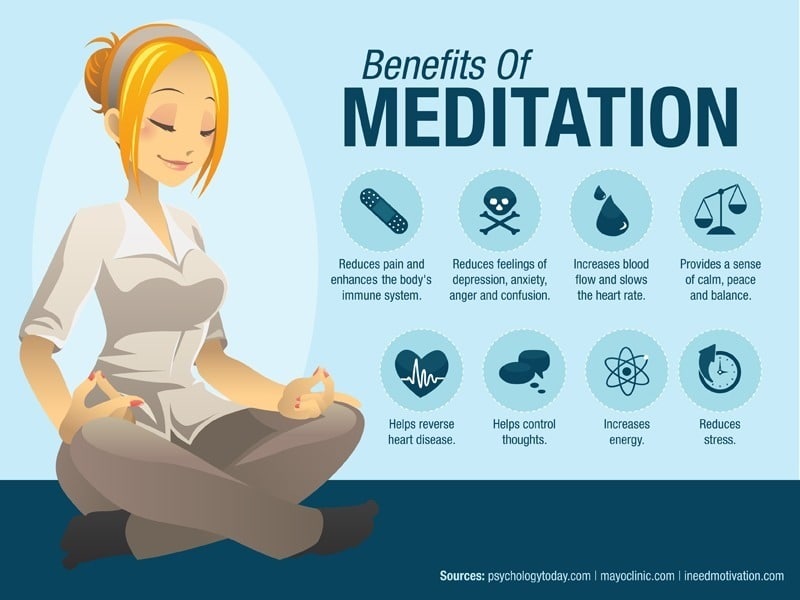
few benefits of meditation infographic
You may have decided to begin a meditation practice for many reasons, but here are some benefits of meditating regularly. If you are just starting out, you can use our meditation timer.
Reduces Stress
One of the best-known benefits of meditation is that it reduces stress. Stress has a lot of harmful effects on your health, including causing inflammation that can lead to various health conditions such as heart disease. Because when you’re under stress, your body also releases the hormone cortisol, which makes you feel hungrier and changes your metabolism so that it stores fat.
A study that looked at mindful meditation found that after the study group practiced eight weeks of mindful meditation, they lowered the levels of their stress-related inflammation.
Another stress-related study also found that meditation reduced stress, especially in those individuals who had higher incidences of stress.
Promotes Emotional Health
Mindfulness meditation can lead to an improved self-image and a more positive outlook. A study published in psychosomatic medicine found that participants had more activity in the part of the brain that is thought to control optimism and positive thinking after a mindful meditation program.
Anxiety

Meditation can help reduce anxiety as well as symptoms of specific anxiety disorders. For example, a three-year follow-up on one clinical study found that participants who had done an 8-week meditation program still practiced meditation three years later and maintained lower anxiety levels.
Meditation has even been shown to reduce anxiety in high-stress jobs.
Here are some other aspects of your life that meditation improves:
Meditation Changes the Brain
But, of course, one of the biggest and most important benefits of meditation is that it changes the brain.
Helps How The Brain Ages
As we get older, we lose brain mass which reduces the volume of the brain. A study done by UCLA showed that people who meditated for 20 years or more had a better-preserved brain than non-meditators. Meditation does not stop the loss of brain mass, however, there was not as much loss in the brain matter as in the non-meditators. So keep that meditation practice going!
Improves Concentration
Believe it or not, meditation can improve concentration in just a short time. His study on mindfulness training found that participants increased their cognitive performance and decreased mind wandering after only two weeks of mindful meditation training. His is significant for those who have ADD.
Makes You Happier
Meditation, well, plain, makes you happier. His brain is strengthened when you practice meditation. People who meditate tend to be more compassionate and empathetic. But studies have shown that when people give to charity, the pleasure center in the brain is activated, giving them a sense of wellbeing. He indicates that one of the authentic sources of happiness is not what we have but what we can do for others.
Learn How to Maintain a Long Term Meditation Practice even if you are a beginner

Now that you know the benefits of long-term meditation, here are some things you can do to help you keep on meditating. Whether you are at the beginning of your meditation path, these tips will help you make the most of the meditation.
Find a Quiet Place to Meditate
Finding a quiet time or place to meditate is vital to your meditation practice, especially for beginners. Take an inventory of when the best time to meditate is and where. Is it before the kids get up or after they go to bed? Is there a nice soothing natural place near your home where you can go like a marsh, stream, or beach alone? Maybe it means going to your car at lunchtime for some quiet.
You will get frustrated quickly if you don’t have a place to meditate without getting interrupted or having distractions.
Be Consistent and Find The Best Meditations for Beginner’s
Being consistent is vital to maintaining a meditation practice. It takes time to form a habit, and meditation is a worthwhile habit to adopt. Even if you can only do 10 minutes at a time at first, you can build up your time. You can also meditate more than once a day. 0 minutes in the morning and 10 minutes in the evening.
Set reminders on your phone to help you remember. After a while, when it becomes a habit, you will miss it if you can’t meditate for some reason.
Start First Thing in the Morning
Not only will you have done your meditation for the day, but you will also feel less tired, and it will give you your mindset for the day. You can start the day with a fresh outlook. 10-minute morning meditation will help you prepare for all the challenges you face during the day.
Don’t Judge Yourself
When you meditate, don’t worry if you are doing it right; do it! Won’t be hard on yourself if you can’t concentrate at first or your mind wanders. The more you practice, the better you get. Even if it’s not perfect, you’ll get benefits from meditating.
Be Flexible
Being flexible helps you not to give up if you don’t meditate when you set aside. Suppose you need to move it to a different time one or two days, no big deal. If you don’t have time one day, do it the next day. If you have to skip a few days, that’s okay too.
Make Meditation a Priority
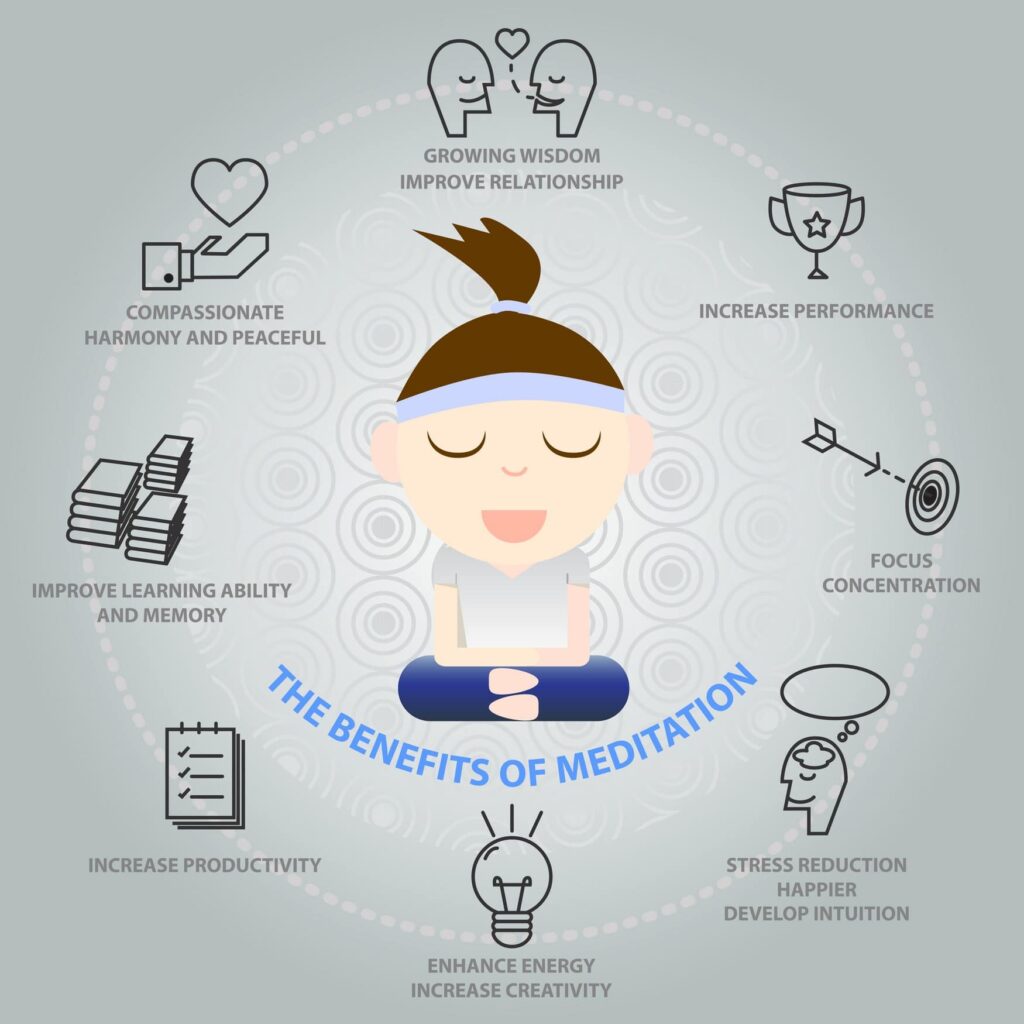
The beginner’s guide to meditation benefits infographic
Prioritize your meditation practice like you would an important phone call or pick up the kids from school. If you need motivation, remember that you are meditating for your physical and mental health. Meditation is your time to self-reflect. It helps you be a better person to those around you.
You have a lot to look forward to if you are beginning your meditation practice. Meditation can improve both your physical and mental health. In addition, Mindtastik can help you advance your meditation practice.
Whether you’re trying to become more self-aware, manage your stress, and you want to achieve a goal, MindTastik offers hundreds of meditations that will bring peace and calm into your mind and help you reach your full potential.
Even if you’ve meditated before or you are just a beginner, our guided meditation app will help you through the meditation process. You can download MindTastik in the Apple App Store or Google Play.

